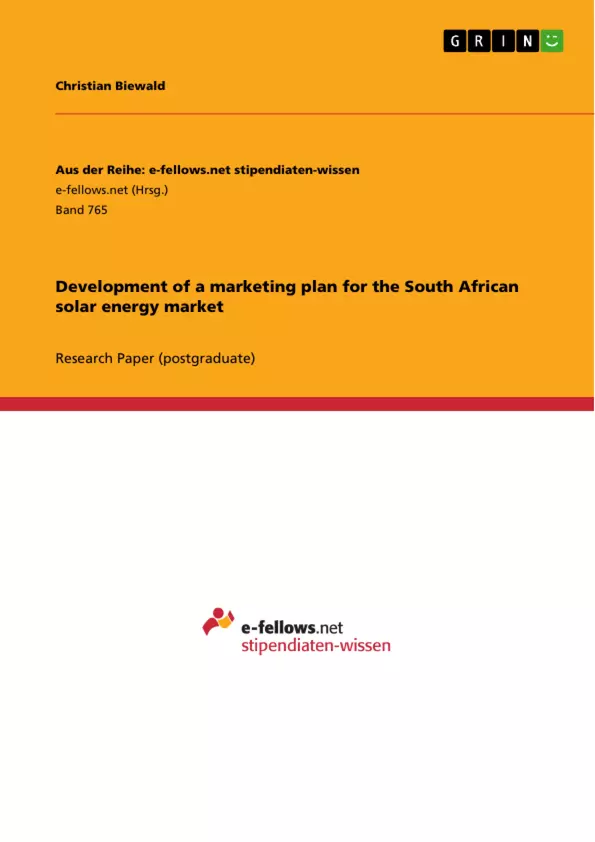One of the current megatrends that developed during the last years was the increasing global demand for energy due to a continuous economic growth in the emerging markets. As a consequence, the availability of natural resources declines steadily. Therefore renewable and sustainable energies like solar, wind or water technologies become more and more important, both in industrialized and emerging markets.
As a specialized manufacturer for renewable energy systems, Diehl Controls is established in the European market for building up energy-efficient solar energy plants. With regards to the company’s growth strategy, emerging markets have become increasingly important, as high market potentials are estimated for countries like South Africa. Therefore, the following term paper describes the development of a marketing plan for Diehl Controls in order to enter the South African solar energy market. Based on an environmental and strategic analysis, the marketing plan concentrates on the SAVE model to describe the strategic implications for the company.
Table of Contents
- Introduction
- Environmental analysis
- PESTLE analysis
- Near environment analysis
- Industry analysis - Porter's Five Forces
- Strategic analysis
- SWOT analysis for Diehl Controls
- Gap analysis
- Development of a marketing plan
- Target market selection
- SAVE - Marketing mix
- Conclusion
Objectives and Key Themes
This term paper examines the development of a marketing plan for Diehl Controls, a specialized manufacturer of renewable energy systems, to enter the South African solar energy market. The paper utilizes an environmental and strategic analysis to develop a marketing plan that focuses on the SAVE model, outlining the strategic implications for the company.
- Environmental analysis of the South African market through the PESTLE framework
- Strategic analysis of Diehl Controls' position within the market using a SWOT analysis
- Development of a marketing plan utilizing the SAVE model
- Identification of target markets within South Africa
- Assessment of the potential and challenges for Diehl Controls in the South African solar energy market
Chapter Summaries
The paper begins with an introduction, outlining the growing global demand for energy and the increasing importance of renewable energy solutions. The introduction highlights Diehl Controls' existing presence in the European market and the company's strategic focus on emerging markets, specifically South Africa.
The subsequent chapter delves into an environmental analysis of South Africa, utilizing the PESTLE framework to assess the political, economic, social, technological, legal, and environmental factors influencing the solar energy market. This analysis provides a comprehensive overview of the market's potential and challenges.
The third chapter focuses on the strategic analysis of Diehl Controls' position within the South African market. A SWOT analysis evaluates the company's internal strengths and weaknesses as well as external opportunities and threats, revealing the company's competitive advantage and areas for improvement.
Finally, the paper explores the development of a marketing plan for Diehl Controls in the South African market. The plan outlines target market selection, the application of the SAVE model (Segmentation, Accessibility, Value, and Engagement), and the strategic marketing mix for entering and succeeding in the market.
Keywords
The keywords and focus topics of this paper include renewable energy, solar energy, emerging markets, South Africa, PESTLE analysis, SWOT analysis, marketing plan, SAVE model, target market selection, market entry strategy, and competitive advantage.
Frequently Asked Questions
What is the focus of this marketing plan for Diehl Controls?
The plan focuses on the strategic entry of Diehl Controls into the South African solar energy market, addressing global energy trends and sustainable technologies.
Which analytical frameworks are used in the paper?
The paper utilizes PESTLE analysis for the environment, Porter’s Five Forces for industry analysis, and SWOT analysis for the company's strategic position.
What is the SAVE model in marketing?
The SAVE model stands for Segmentation, Accessibility, Value, and Engagement, and is used here as a modern alternative to the traditional marketing mix.
Why is South Africa a target market for solar energy?
South Africa is considered a high-potential emerging market due to its increasing energy demand and the decline of traditional natural resources.
What are the key themes of the environmental analysis?
The PESTLE analysis covers political, economic, social, technological, legal, and environmental factors specific to the South African energy sector.
- Citar trabajo
- Dipl.-Wirtsch.-Ing. Christian Biewald (Autor), 2013, Development of a marketing plan for the South African solar energy market, Múnich, GRIN Verlag, https://www.grin.com/document/231358



